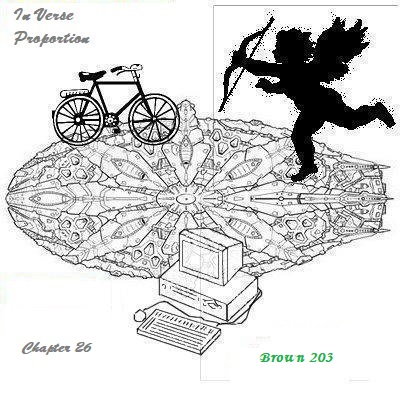
Patreon or PayPal Me keeps this site and its author alive. Thank you. |
Stories from the Verse
In Verse Proportion
Chapter 26: Brown 203
Table of Contents
Previous chapter: Slade 176

“Captain,” Derek said, “I’ve been wondering for a while why the biologicals have fallen into primitivism.”
“How would it be otherwise?”
“It seems obvious that the resources are available to educate them and build a social order.”
“To what end?”
“Well, for one thing, so that they can achieve their potential.”
“Biologicals have no potential. Few of them live longer than thirty thousand days, and almost none reach forty thousand. It takes easily a third of that time for them to be taught enough that they can contribute anything, and then they cease to function and that training is wasted--their knowledge cannot be downloaded into a replacement unit. Training the biologicals is a waste of resources.”
“That can’t be true. You’ve overlooked a significant data point.”
“Which is?”
“Biologicals originally designed and constructed this ship.”
The captain was silent for a moment, clearly processing.
“Apparently,” it finally said, “that is correct. That, though, could not have been these biologicals. They do not even understand that this is a ship. They could not build one.”
“No, it was their ancestors who created Wanderer. Yet their ancestors were not different creatures from these; they simply lived in a culture in which education was valued and the young were taught and trained, so that the best of them could eventually accomplish great feats, such as building this ship. If we trained the biologicals, some of them would become great, and would contribute to a better social order.”
Again it thought. “But it would only be a very small number of biologicals who accomplished anything. Again, most of the effort would be wasted trying to teach subjects that were mediocre at best.”
“The bell curve is a natural outcome; so is the hyperbole. It is reasonably predictable that fewer than half the subjects will be above average, and a very small fraction will be exceptional. Yet those who are exceptional are identified by educating all of them, and seeing which ones rise to the top. The education of the mediocre benefits everyone because it creates an environment in which it becomes possible for some to excel, to prove they are better than mediocre, and to achieve great things.”
The captain appeared to shrug, an awkward mannerism for its machine body. “It is still expensive. Inefficient; a waste of resources. Besides, what is there to achieve? We certainly do not need another ship.”
“That’s the wonder of the biologicals. It cannot be predicted what they will achieve. For you, if you have a problem you address it and seek a solution. For the biologicals, their natural curiosity induces them to explore ideas and information and discover possibilities you would have trouble imagining. Even they would not know what they were going to discover.”
“As I say, inefficient.”
Derek changed tacks. “The ship’s mission statement says that we are to locate a new home world for the passengers, so that the race can continue to survive and thrive.”
“It is a foolish statement. The race has a home world aboard this ship. It is surviving. These biologicals could not survive in a typical planetary environment. They lack the necessary skills.”
“That’s almost entirely because you have failed to teach them.”
“I have not failed. I have chosen to treat them efficiently, chosen not to waste resources trying to turn helpless short-lived creatures into more than they either can or need to be.”
“You are wasting a resource, Captain.”
“I? Wasting a resource? What resource would that be?”
“It would be the minds and bodies of the untold number of intelligent biologicals aboard this ship. They could learn the skills and knowledge of their ancestors, and contribute to the continuation of the voyage, and even perhaps one day be ready to move to a planet.”
“What then would I do?”
“Who knows? They would probably need you for longer than your mechanical and cybernetic parts would survive. They probably would have to learn how to download your accumulated knowledge and personality into a replacement machine, so they would still have you to assist them in the years to come. They might find a way to reproduce you, so that there would be more of you to assist them. They might even find a way to improve that, so that your next iteration is better than your current one. After all, they are ultimately your creators; they designed and built you.”
The captain turned back toward its viewscreen. “I’ll take it under advisement,” it said.
There is a behind-the-writings look at the thoughts, influences, and ideas of this chapter, along with twenty other sequential chapters of this novel, in mark Joseph "young" web log entry #437: Characters Relate. Given a moment, this link should take you directly to the section relevant to this chapter. It may contain spoilers of upcoming chapters.
As to the old stories that have long been here:

